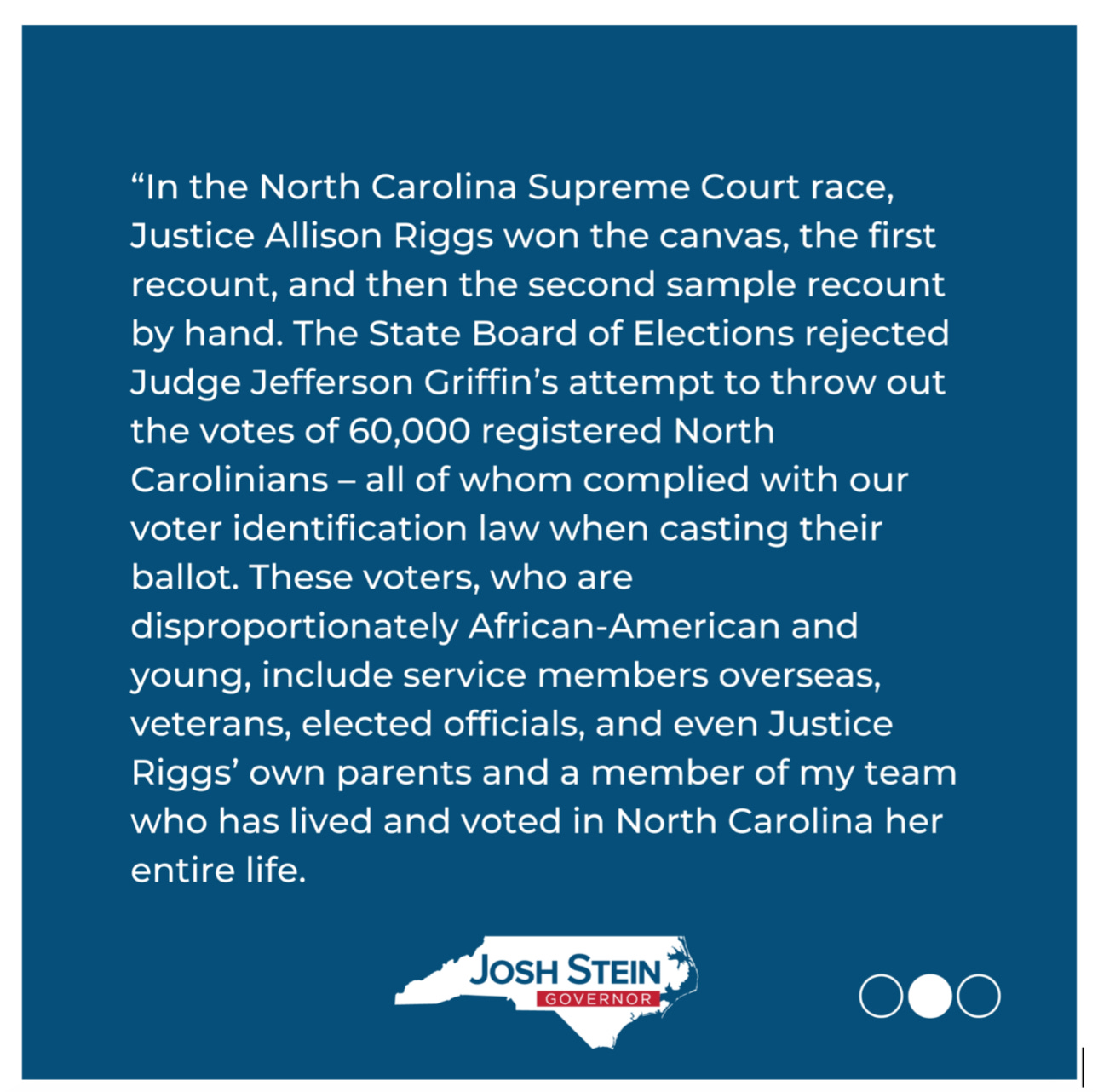A Laboratory of Autocracy
A stay of certification of a North Carolina state Supreme Court justice’s election by its own majority represents a new twist and a dangerous threat to democracy.
There’s little that stuns me these days from Republican bad faith actors. But yesterday’s headlines out of North Carolina made me catch my breath, at least until I heard myself cursing aloud.
Here’s the top line news: The GOP-dominated North Carolina state supreme court has halted the election certification of one of its Democratic members, Justice Allison Riggs. That’s right, the Court has decided that it will decide who will sit on the bench among its justices.
Let me be very clear. This election is over, and Justice Riggs won. The race was very tight, as it often is in that state. Riggs won by just 734 votes out of a total of 5.5 million cast. No less than two recounts confirmed her victory. As a point of comparison, when a Democratic supreme court candidate lost an even closer race by 401 votes in 2020, she conceded after the second recount.
The recounts should have been the end of it, but no. The Court has now agreed to hear a case filed by Justice Riggs’s opponent, Judge Jefferson Griffin of the state Court of Appeals, demanding that over 60,000 mail-in votes cast in that election be disqualified. If the Court agrees with this madness, state law would require a complete do-over of that election (and of course, no other election, including Trump’s electoral win in the state).
It’s an unprecedented, dangerous, anti-democratic move that, as I’ll discuss below, even the most extreme election denialists wouldn’t touch as part of their strategy. Together with the GOP’s other recent attacks on democracy in that state, North Carolina is in danger of tipping into one-party rule, just as we’ve seen in Florida. This is happening even as—or perhaps precisely because—the state’s voters have consistently elected Democrats to the highest statewide offices.
Filling in the missing blanks?
The gist of the lawsuit is so absurd as to be laughable, except that no one is laughing now.
To understand how we got here, we need to go back to 2004. The North Carolina legislature passed a law that year requiring a driver’s license or social security number when registering to vote. That’s a bit stricter than other states and often results in disproportional disenfranchisement of minority voters, but it’s not unheard of.
But here’s where it gets wonky. A widely used voter registration form printed at the time failed to include a place for registrants to actually provide the required ID. As a consequence, over the years thousands of voters unwittingly registered without providing an ID required under state law.
It is reasonable, and logical, to presume that completing an official state form as printed should result in a proper voter registration. But no! Griffin now argues that any registrations that failed to provide an ID number simply should not count today.
In his challenge, Griffin has targeted over 60,000 mail-in votes, with the greatest impact on racial minorities who tend to vote Democratic. An analysis of the voter challenges by the local News & Observer in North Carolina found that Black voters were twice as likely to have their votes challenged as white voters.
Further, mail-in votes in general tend to skew Democratic ever since the pandemic and as a result of Trump’s false and conspiratorial statements about the security of mail-in voting. And in a twist, the affected registrations happen also to include both of Justice Riggs’s elderly parents.
Griffin asserts this claim, and the state Supreme Court has agreed to hear it, even though there is no evidence that any voter who cast a ballot was otherwise ineligible to vote; most mail-in ballots provided proof of identification anyway; and the missing information was not the applicants’ fault.
In short, the GOP is seeking to change the rules after the fact and get handed a win by a partisan court. So you can understand Justice Riggs’s astonishment and frustration and the profound concerns of democracy activists.
Indeed, the idea of going back to the voter registrations and trying to find ones you could throw out on technicalities like this was raised and considered by some of the worst organizations that promote outright election denialism, such as the so-called “Election Integrity Network.” And even there, the idea met with resistance and got shot down. As ProPublica reports,
Months before voters went to the polls in November, a group of election skeptics based in North Carolina gathered on a call and discussed what actions to take if they doubted any of the results.
One of the ideas they floated: try to get the courts or state election board to throw out hundreds of thousands of ballots cast by voters whose registrations are missing a driver’s license number and the last four digits of a Social Security number.
But that idea was resisted by two activists on the call, including the leader of the North Carolina chapter of the Election Integrity Network. The data was missing not because voters had done something wrong but largely as a result of an administrative error by the state. The leader said the idea was “voter suppression” and “100%” certain to fail in the courts, according to a recording of the July call obtained by ProPublica.
Similarly, when Griffin first lodged his protest in December before the state’s Elections Board, lawyers for Justice Riggs argued that the claim “amounted to a ludicrous request for a do-over”:
“Whether playing a board game, competing in a sport or running for office, the runner-up cannot snatch victory from the jaws of defeat by asking for a redo under a different set of rules,” they said. “Yet that is what Judge Griffin is trying to do here.”
Democrats in North Carolina are understandably fighting mad about the suit, accusing Griffin and the state GOP of seeking to overturn the election results. As state Democratic Party Chair Anderson Clayton said in a news release, Justice Riggs “deserves her certificate of election and we are only in this position due to Jefferson Griffin refusing to accept the will of the people. He is hellbent on finding new ways to overthrow this election but we are confident that the evidence will show, like they did throughout multiple recounts, that she is the winner in this race.”
Governor Josh Stein also weighed in, noting that the race is and should remain over, and that Griffin’s challenge was even affecting a member of his own team.
Federal vs. state review
It’s no secret that the state’s Supreme Court is divided sharply and bitterly along partisan lines, just as we’ve seen in other swing states like Wisconsin. The Court held a previous Democratic majority until 2022, when two seats flipped to the GOP and the Court began overturning big rulings, leading to charges that Republicans were forsaking precedent for partisan advantage.
The Chief Justice of the Court, Justice Paul Newby, was a prominent supporter of Griffin’s election campaign. And in typical radical jurist form, he has not recused himself from this case, even though Riggs has.
Both Riggs and the state’s Elections Board, which is controlled 3-2 by the Democrats, understood that any legal path leading to the GOP-controlled state Supreme Court was a fraught one. So she and the Board tried to have the case heard in federal court. But they drew a Trump-appointed judge, who promptly kicked it back to the state system, ruling that this was primarily a matter under state law.
He made this ruling despite federal law that, according to the state’s Democratic Party, prohibits states from disqualifying ballots simply because a voter’s registration lacks an ID such as a driver’s license or Social Security number. In fact, the GOP’s lawyers raised the exact same claim about missing registration numbers earlier this year in a lawsuit that seeks to strike nearly a quarter million people from the voter registrations rolls. The case was properly moved to a federal court, as this case should have been, where it is still pending, though any ruling would not apply to this election.
There’s still a chance that the case doesn’t wind up before the partisan and biased state Supreme Court. Riggs and the Elections Board have appealed the federal ruling sending the case back to the state, and that is now before the Fourth Circuit. Any ruling moving the case back to the federal system would need to happen soon; the state Supreme Court has set a hearing date of January 24 over this matter.
An anti-democratic pattern
The state’s Supreme Court has already shown its partisan stripes before and even affected national politics. Recently, it allowed the GOP to re-gerrymander the state’s district lines and squeeze three Democratic congressional seats out of realistic contention. This happened just one election after the same Court, then with a liberal majority, approved maps apportioning the purple state fairly at seven seats for each party.
Those three lost seats cost the Democrats the Congressional House majority in 2024, proving that local and state politics can have lasting national consequences.
This past fall, following statewide elections that saw Democrats prevail up and down the ticket, the GOP legislature, which itself is ensconced through brutal gerrymandering, voted to strip the new Democratic governor of his power to appoint state Elections Board members. This is a dangerous move now under challenge by the governor’s office. If ultimately successful, it would hand the GOP the power to control and administer elections in the state.
If the move to disenfranchise over 60,000 North Carolina voters over an immaterial and unknown technical defect is any indication, a remaking of the Elections Board by the GOP would deal another heavy blow to democracy in the state. The GOP there has demonstrated time and again that it will act in bad faith in the pursuit of raw power, and now the ultimate question—one of democracy itself—has reached the cynical and feckless majority of the state Supreme Court.
It sadly may prove true that the only message the GOP in North Carolina will ever understand is one of resounding electoral defeat. That worked in Wisconsin, when in 2023 a progressive Supreme Court candidate destroyed the MAGA one by double digits in a special election where voters had grown tired of extremists’ dirty political tricks. That state’s grotesque gerrymanders are now a thing of the past, and party representation at the state level (and soon national level) far better reflects realities on the ground in that state.
A similar wake-up and shake-up in North Carolina is long overdue.




Goodness, Jay. I honestly don’t know how you keep the top of your head from flying off. How much more skullduggery can you bear to uncover. But I’m eternally thankful that you’re on the job. Local races matter so much more than people realize.
This is insane and also extremely frightening.